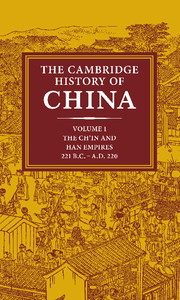Book contents
- Frontmatter
- Introduction
- 1 The state and empire of Ch'in
- 2 The Former Han dynasty
- 3 Wang Mang, the restoration of the Han dynasty, and Later Han
- 4 The conduct of government and the issues at stake A.D. 57–167
- 5 The fall of Han
- 6 Han foreign relations
- 7 The structure and practice of government
- 8 The institutions of Later Han
- 9 Ch'in and Han law
- 10 The economic and social history of Former Han
- 11 The economic and social history of Later Han
- 12 The religious and intellectual background
- 13 The concept of sovereignty
- 14 The development of the Confucian schools
- 15 Confucian, Legalist, and Taoist thought in Later Han
- 16 Philosophy and religion from Han to Sui
- Bibliography
- Glossary-Index
- Map 7 The Han empire, 143 b.c.
- Map 8 The Han empire, 108 b.c
- Map 9 The Han empire, a.d. 2
- Map 12 The Han empire, a.d. 140">
- References
3 - Wang Mang, the restoration of the Han dynasty, and Later Han
Published online by Cambridge University Press: 28 March 2008
- Frontmatter
- Introduction
- 1 The state and empire of Ch'in
- 2 The Former Han dynasty
- 3 Wang Mang, the restoration of the Han dynasty, and Later Han
- 4 The conduct of government and the issues at stake A.D. 57–167
- 5 The fall of Han
- 6 Han foreign relations
- 7 The structure and practice of government
- 8 The institutions of Later Han
- 9 Ch'in and Han law
- 10 The economic and social history of Former Han
- 11 The economic and social history of Later Han
- 12 The religious and intellectual background
- 13 The concept of sovereignty
- 14 The development of the Confucian schools
- 15 Confucian, Legalist, and Taoist thought in Later Han
- 16 Philosophy and religion from Han to Sui
- Bibliography
- Glossary-Index
- Map 7 The Han empire, 143 b.c.
- Map 8 The Han empire, 108 b.c
- Map 9 The Han empire, a.d. 2
- Map 12 The Han empire, a.d. 140">
- References
Summary
In the state cult of the Han dynasty, Heaven was the supreme deity, a deity which was believed to guide the fate of the world directly. The emperor, or Son of Heaven, was its representative and ruled by its favor. A dynastic founder, as the first recipient of Heaven's mandate, was chosen over all others for his personal merit. The last emperor of a dynasty lost the mandate, because he and his house were no longer fit to rule. The coming of the mandate was heralded by auspicious omens, the decline of Heaven's favor was announced by portents.
The belief in the Mandate of Heaven deeply influenced Chinese historiography. The ancient historians quoted, suppressed, twisted, and even falsified evidence to show why the dynastic founder had been worthy of Heaven's blessing, a worthiness about which he personally had no doubt. His emphasis was on legitimacy. Those who unsuccessfully opposed the mandate were manifestly inferior men, whose lack of moral caliber was borne out by their fates. There the ancient historian leaned in the opposite direction: He wrote biased biographies for the most important rebels and pretenders, who by their actions had placed themselves outside ordered society. Further he did not go; no additional biographies were compiled for the chief assistants of those who had turned against the legitimate dynasty.
This is the historiographical situation, which is a major obstacle to a fair assessment of such men as Wang Mang, who overthrew the Former Han house and attempted to found his own dynasty.
- Type
- Chapter
- Information
- The Cambridge History of China , pp. 223 - 290Publisher: Cambridge University PressPrint publication year: 1986
References
- 14
- Cited by

